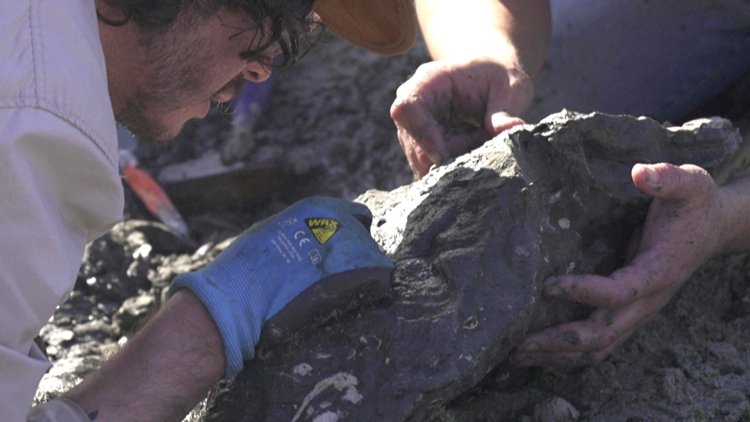Paleontologists Rescue Ancient Marine Reptile

Paleontologists work quickly before the tide comes in on a beach on the central coast of Chile: they rescue the fossil remains of a unique marine reptile that lived 70 million years ago, a treasure for scientists.
With their shoes and pants soaked, the experts extract from the rocks the remains of an "elasmosaurus," a marine inhabitant in the Cretaceous era, which began 145 million years ago and ended 66 million years ago.
It is a species with a small head, a long neck and extremities modified into fins.
The remains were found on Algarrobo beach, a popular resort 100 km west of Santiago.
It is of special interest to science because its skeleton - between 10 and 12 meters long - is practically complete, something very uncommon in this type of find.
"It is older than other records we had of elasmosaurus. The previous ones were from the late Cretaceous, about 66 million years ago. This one would be a little older, about 70 million years old," says University of Chile paleontologist Rodrigo Otero, who is in charge of the expedition.
Unlike other discovered elasmosaurus, which were filter feeders and fed on plankton, this specimen had teeth and fangs, proof that it ate fish.
"It would be something new within what we know. We don't know if it's going to be a new genus, a new species, but it is a type of animal that we didn't have fully registered in Chile," he adds.
There begins the slow and meticulous work of cleaning the skeleton of the elasmosaurus trapped in the rock, with small chisels and hammers.
The first thing that came out of the rocks extracted this month was a tooth, fossilized and black, two centimeters long.
In order to extract it, the scientists of the Paleontological Network of the University of Chile have had to organize expeditions on days when there are few peo















